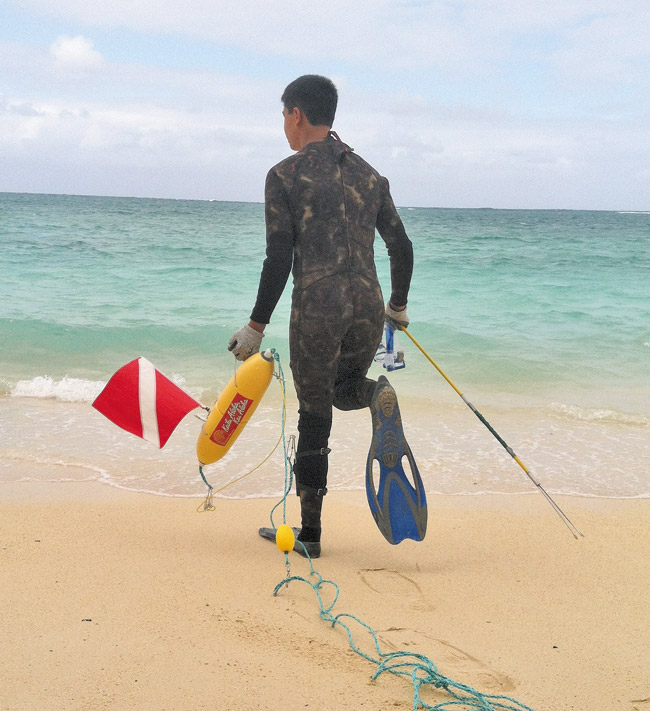Learning To Dive Responsibly
I watch with much satisfaction as he meticulously prepares for his dive. He carefully looks over his equipment, making sure everything is sound and safe. He is relatively new to the sport of spearfishing, but his passion for it has grown quickly.
But what makes me beam with pride is his growing understanding of what it means to be a responsible fisherman and knowing the value of our precious ocean resources.
“Be safe, son, and remember: only gather what we’re going to eat,” I tell my youngest son Tai-John.
He flashes me the shaka sign, enters the ocean and slowly swims away. My little man isn’t so little anymore.
There are many rewarding moments when you’re a parent. One of them is watching your child follow in your footsteps and embrace the activities you did as a youngster.
The ocean always has been my playground, and it has become my son’s as well. But on this particular day, at the end of a two-hour dive, Tai-John gave me the greatest gift of all with one innocent statement.
Noticing his fish stringer was bare, I asked, “How was it out there?”
“Not bad, lots of fish but too small!” he says matter-of-factly. “Nothing we’d eat. Next time!”
He had no idea this was music to my ears. All my preaching about kuleana and lessons about being responsible were obviously heard.
Ironically, this day came less than a week after I did a story for KHON2, about an irresponsible fisherman at Kahana Bay, who had left an oversized net behind, killing hundreds of fish and marine life.
Veteran diver Enson Park stumbled upon the lay net he said “went on forever.” Enforcement officers later estimated it was in excess of 1,700 feet. The legal rule is 125 feet.
“We have a fisherman who is very irresponsible – extraordinarily irresponsible,” says Department of Land and Natural Resources director William Aila. “Number one, he’s not following the rules and regulations. And two, this net is certainly not marked or labeled, so there’s no accountability. Obviously this is someone who knows they are not following the rules and took all the steps necessary to avoid detection.”
“You’re harvesting illegal-sized fish and you’re not even picking them up and actually eating them and using them, they’re just sitting out there rotting,” says an angry Park. “It’s terrible. It’s such a detriment to the state, it’s such a detriment to the population out here that some of us just don’t care, and it’s upsetting, really upsetting!”
Somewhere along the way, the owner of the illegal net did not receive the proper message or lessons, and if he did, he certainly forgot the importance of being responsible.
Aila credits Park for his quick reaction and his willingness to come forward. He says Park’s passion to protect our resources saved the lives of hundreds of other fish.
“The public, the divers, the fishermen, they are our eyes and ears,” says Aila. “The fishermen and the divers out there who are responsible are doing a very good job at notifying us to keep irresponsible fishermen and divers in check. It is our kuleana, it’s our responsibility to take care of our resources, and this individual did not. This individual actually did not display or demonstrate any kuleana at all. The opposite, he provided an example of how not to behave.”
This without a doubt was an adult, and some believe may have been several adults, considering the amount of net that was left behind.
Yes, it was a prime example of what not to do, but it was also an opportunity to educate.
I was very proud of my son that Sunday morning in Windward Oahu. He easily could have speared something small but chose not to, even when he knew no one would know.
That’s discipline. That’s being responsible. That’s caring about the future.
rkmizutani@gmail.com






